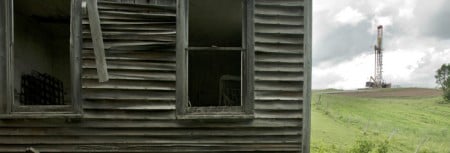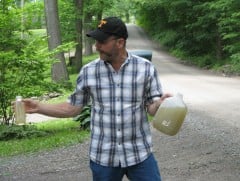Join the Call for a Moratorium on Gas Drilling in New York

Photo Courtesy Giles Ashford
View more images on our Flickr site
by Craig Michaels
The oil and gas industry talks a lot about the hard working men and women it employs. But we hear a lot less about the hard working men and women whose lives it destroys. There are the tragic casualties, the brave workers who die at the hands of violent explosions and unimaginable horror, including the 11 people who died aboard the Deepwater Horizon and the workers that were killed and injured in gas explosions this past week in Pennsylvania, West Virginia and Texas.
And then there are the hardworking families who open their land in good faith to gas companies only to receive heartache in return.
Last week we traveled to Dimock, Pennsylvania with our Chief Prosecuting Attorney, Robert F. Kennedy, Jr., Riverkeeper board member Mike Richter, Marc Ruffalo, and our colleagues from NRDC, Catskill Mountainkeeper, and Damascus Citizens for Sustainability. We went down there to visit residents whose lives have been permanently impacted from hydraulic fracturing (fracking) gas operations in the Marcellus Shale.Even after working on this issue for two years, what we witnessed firsthand shocked us. We saw polluted well water and heard methane bubbling up out of a local well after a hydraulic fracturing operation polluted it. We saw countless heavy trucks barreling down rural roads not designed to handle this activity. We heard stories of the incredibly loud noise of 24-hour fracking operations, the intense lights which kept children up at night, numerous instances of unreported spills and accidents. In short, we saw the industrialization of a rural landscape.
In a recent lawsuit, more than 60 Dimock residents allege that Cabot Oil & Gas, which operates over 60 wells in a nine-square mile tract in Dimock, engaged in fraud and that the company’s negligence resulted in environmental contamination and health injuries. The plaintiffs allege that Cabot caused: combustible gas to be released into the headspaces of plaintiffs’ water wells; elevated levels of dissolved methane to be present in water wells; natural gas to be discharged into plaintiffs’ groundwater; diesel fuel and other pollutants to be spilled onto plaintiffs’ property and near water wells; and two explosions in a water well that resulted from methane gas.
Unfortunately, this story does not stop at the Dimock town line. In fact, Pennsylvania DEP has initiated over 100 enforcement actions against gas companies in 2010 alone. The night we left Dimock, a well exploded in Pennsylvania, spewing explosive gas and wastewater 75 feet into the air. On Monday, there were explosions in West Virginia (7 workers injured as flames shot 70 feet high) and Texas (one dead, six injured).
All across the country, landowners are realizing that they were sold a bill of goods that wasn’t backed by much more than a wink and a nod. Many now find themselves with depreciated property values and contaminated well water. Some can still light their taps on fire and are now forced to live under the constant specter of industrialization.What’s worse is that in states like New York that have compulsory integration statutes, even landowners who want nothing to do with drilling can be “compelled” to allow gas drilling under their land if a certain percentage of surrounding landowners sign leases.
If the past is any indication of what the future holds, the oil and gas companies intend to drill to the ends of the earth as the promise of a cleaner, brighter future remains unfulfilled. These industries share the same lobbyists and the same trade associations. They consistently mislead the public and fight hard to regulatory oversight. Worst of all, they share the same mantra: drill first, ask questions later.
That’s why a groundswell is needed now to stop them from ruining our watersheds. High-volume hydraulic fracturing combined with horizontal drilling is not safe. It is not proven. And unless we want companies like Shell Oil coming into our towns (Shell recently entered the Marcellus play by acquiring East Resources’ holdings), it’s time to stand up for watershed protection.
Contact your local Assembly and State Senate members now and tell them to support Bill number A-10490/S-7592, (the Englebright/Addabbo bill) that would place a moratorium on gas drilling in New York until the EPA completes its two-year study on the relationship between fracking and drinking water contamination.
Whether your water comes from the Catskills or the Delaware River or up from a private well, decide for yourself whether the benefits are worth the risks and make sure your families, friends, and neighbors are ready when the gas companies come knocking.



